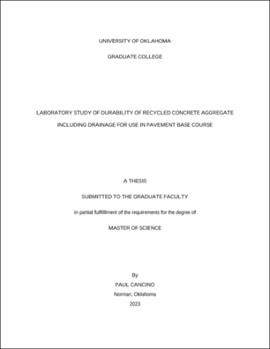| dc.description.abstract | Recycled concrete aggregates (RCAs) have been used as a cost-effective and environmentally friendly material in pavement base construction for quite some time. However, there is a lack of information on the durability, strength, and hydraulic properties of RCA in Oklahoma. The purpose of this study was to generate data on these properties of commonly used RCAs in Oklahoma through laboratory testing and to determine the changes in properties caused by field placement and compaction. Additionally, the performance and costs were evaluated using AASHTOWare Pavement ME simulations. The service life (performance-based) and life cycle cost analyses (LCAs) of aggregate bases of two selected pavements, a flexible pavement (SH-48) and a rigid pavement (SH-33), were studied using the AASHTOWare Pavement ME software. Laboratory testing in this study included particle size distribution, shape indices (angularity and texture), wash loss, optimum moisture content (OMC) and maximum dry density (MDD), Los Angeles (LA) abrasion, durability indices (Dc and Df), hydraulic conductivity (k), and resilient modulus (Mr). The upper and lower limits of Type A gradation, as specified by the Oklahoma Department of Transportation (ODOT), were used for laboratory testing to reduce variability in test results.
It was found that the source material used to produce the RCAs had a significant impact over the quality and properties in terms of stiffness, durability, and performance, with RCAs produced on-site from highways pavements having improved properties compared to those produced in recycling plants. The durability of fines (Df) was found helpful as a screening tool for RCAs since most of the RCAs did not meet the ODOT’s requirements. Also, based on laboratory test results, the permeability of the aggregate bases is expected to exhibit a significant reduction with field placement and compaction. This study also showed that recycled aggregate bases could be built at a lower cost compared to virgin aggregates. The findings suggest that recycled aggregates can be a sustainable and cost-effective alternative for pavement bases, provided that proper selection and quality control measures are implemented. | en_US |
